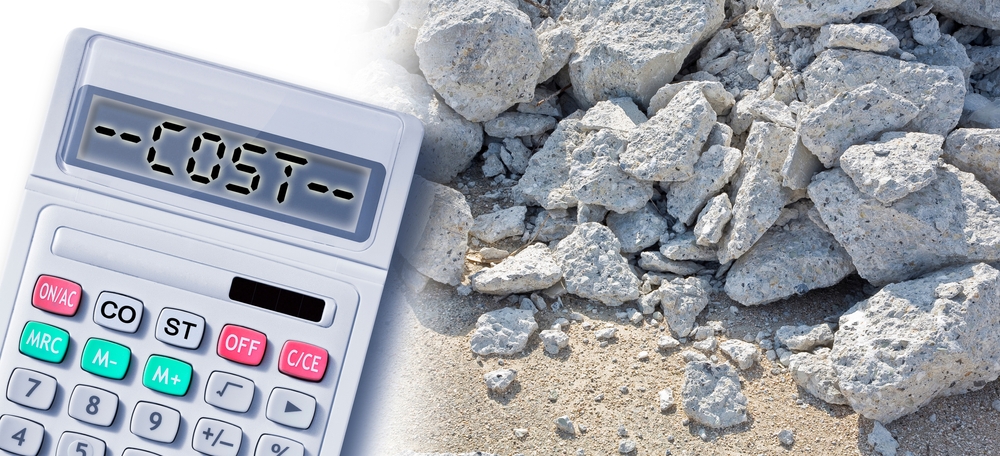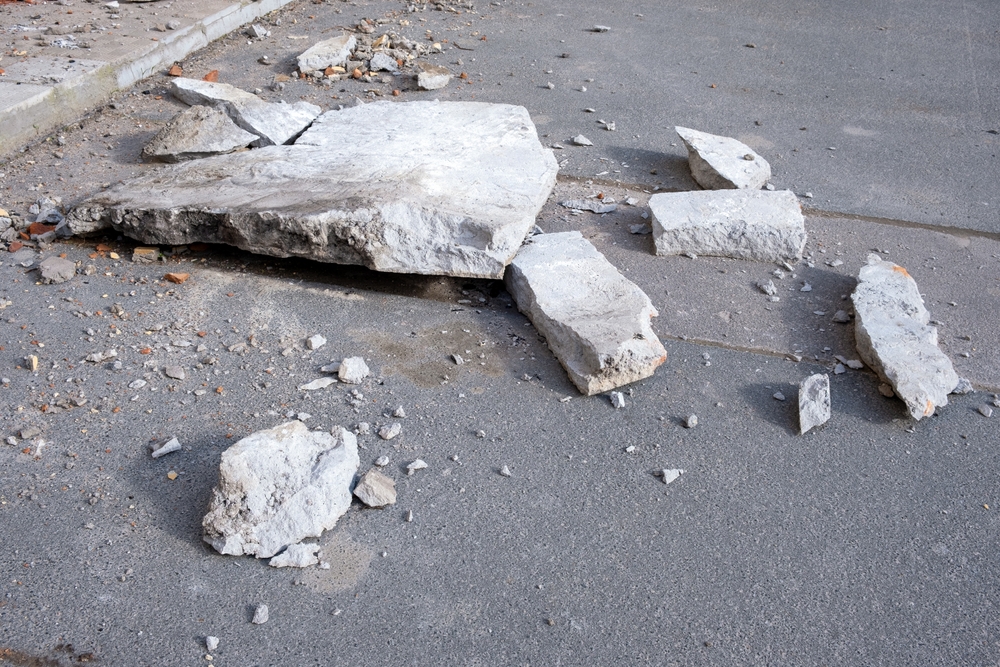March 5, 2024 - Benjamin Ehinger
Concrete Weight Calculator: Your Guide to Accurate Measurements
CALL NOW 844-762-8449
When planning a project that involves concrete, understanding the weight of the concrete is crucial for logistics, such as determining what size of concrete dumpster rental you might require. Estimating the weight by hand can be challenging, given that it involves calculations based on volume and density, which vary by concrete type. A concrete weight calculator simplifies this task significantly. It provides a quick and easy way to estimate the weight of concrete needed for various construction projects, whether you’re working on a simple home improvement job or a larger commercial build.
The use of a concrete weight calculator allows for more precise planning and can help prevent over-ordering or underestimating the amount of material needed. Calculating the appropriate weight is also important for ensuring the stability and longevity of a structure, as well as staying within safety regulations for transportation and waste management. Accurate weight estimations are important for cost efficiency, preventing material wastage, and ensuring that the structural requirements of your project are met.
Next, you need the density of concrete, which can vary depending on the type of concrete and its composition but generally ranges from 2,300 to 2,500 kg/m³. For example, Portland concrete has a typical density of around 2,300 kg/m³.
To put this into practice:
If you have 15 m³ of Portland concrete:
 When utilizing a concrete weight calculator, you will encounter two main components that are essential for accurate calculations: the estimation of the concrete’s volume and the understanding of its density.
When utilizing a concrete weight calculator, you will encounter two main components that are essential for accurate calculations: the estimation of the concrete’s volume and the understanding of its density.
 When estimating the weight of concrete for your project, accurate calculations are crucial to avoid over or under-ordering. Multiple factors influence the overall weight, and understanding these can help you generate a more precise estimate.
When estimating the weight of concrete for your project, accurate calculations are crucial to avoid over or under-ordering. Multiple factors influence the overall weight, and understanding these can help you generate a more precise estimate.
Always double-check your numbers and consult with a professional if uncertainties arise. Accurate weight estimation minimizes the risk of material waste and ensures that your structure has the necessary support.
Key Takeaways
- A concrete weight calculator is vital for precise material planning and can prevent over-ordering.
- Accurate concrete weight estimations ensure structural integrity and compliance with safety regulations.
- Calculators help in determining the correct dumpster size for concrete waste management.
Basics of Concrete Weight Calculation
Calculating the weight of concrete is crucial for various construction projects as it affects the structural integrity, logistics, and safety. To determine how much concrete weighs, you use the standard formula: Weight = Volume × Density First, identify the volume of concrete you need. This is typically measured in cubic meters (m³) or cubic yards (yd³). Remember, the volume is affected by the shape and size of the area that the concrete will fill.| Shape | Formula for Volume |
|---|---|
| Rectangular | Length × Width × Height |
| Circular | π × Radius² × Height |
- Density: 2,300 kg/m³
- Weight: 15 m³ × 2,300 kg/m³ = 34,500 kg
Concrete Weight Calculator Components
 When utilizing a concrete weight calculator, you will encounter two main components that are essential for accurate calculations: the estimation of the concrete’s volume and the understanding of its density.
When utilizing a concrete weight calculator, you will encounter two main components that are essential for accurate calculations: the estimation of the concrete’s volume and the understanding of its density.
Concrete Volume Estimation
To determine the weight of concrete, first, you need to estimate the volume that your project requires. Concrete calculators will often provide formulae or tools for different shapes and sizes, such as slabs, footings, or walls. By inputting the necessary dimensions—length, width, and height—you can calculate the volume of concrete needed. Visit Concrete Weight Calculator – Inch Calculator for a practical tool to help estimate the volume for your specific project.Density of Concrete
The density of concrete is a critical factor that influences the final weight. Typically, the density of conventional concrete is approximately 2,400 kilograms per cubic meter (kg/m³), but this can vary based on the materials used and the moisture content within the concrete. For a deeper understanding of how these values come into play, review the information provided by Concrete Weight Calculator, which emphasizes the importance of matching the units of measure when calculating the weight.Calculation Process and Formulas
To accurately determine the weight of concrete, you’ll engage with specific formulas that account for the density of your chosen concrete type and reinforcement materials used.Using Standard Formulas
When calculating the weight of concrete, the standard formula you apply is: Weight of Concrete (W) = Volume (V) × Density (D)- Volume (V) is typically measured in cubic feet (cu ft) or cubic meters (m³), calculated as length × width × height for rectangular shapes.
- Density (D) varies between different types of concrete and is usually given in pounds per cubic foot (pcf) or kilograms per cubic meter (kg/m³). For standard concrete, densities range from approximately 145 to 155 pcf or 2,300 to 2,500 kg/m³.
Incorporating Reinforcements
If your concrete structure includes reinforcements such as rebar or mesh, which is common in many construction projects to enhance the strength of the concrete, you need to include the weight of these materials in your total calculation. The weight calculation for the reinforced concrete will be: Total Weight of Reinforced Concrete (TW) = Weight of Concrete (W) + Weight of Reinforcements (WR)- Calculate the Weight of Concrete (W) using the standard formula above.
- Determine the Weight of Reinforcements (WR) by calculating the total weight of the individual bars or the mesh, which depends on the material’s density and the amount used.
Practical Tips for Concrete Weight Estimation
 When estimating the weight of concrete for your project, accurate calculations are crucial to avoid over or under-ordering. Multiple factors influence the overall weight, and understanding these can help you generate a more precise estimate.
When estimating the weight of concrete for your project, accurate calculations are crucial to avoid over or under-ordering. Multiple factors influence the overall weight, and understanding these can help you generate a more precise estimate.
- Volume of Concrete: It’s imperative to calculate the volume of concrete needed for your project. Use a concrete volume calculator to determine the cubic meters or yards based on the area you will cover.
- Density: Concrete density varies based on the mix and aggregates used. However, standard concrete typically weighs 2,300 kg/m³. Adjust your calculations based on the specific type of concrete by referring to a concrete weight calculator.
- Shape Matters: The shape of your concrete structure can affect how you calculate its volume. For example, a cylindrical column has a different volume calculation than a slab or wall.
- Additional Materials: If your project includes reinforcement materials such as rebar or wire mesh, remember to include their weight separately as this will add to the total concrete weight.
- Safety Margin: Always consider ordering a bit more than your calculated weight to account for variations in mixture and inaccuracies in volume estimation.
| Shape | Formula for Volume |
|---|---|
| Rectangle/Square | Length × Width × Height |
| Cylinder | π × Radius² × Height |
Frequently Asked Questions
In this section, you’ll find concise answers to common questions around the specifics of concrete weight calculation.How much does a cubic meter of concrete weigh?
A cubic meter of concrete typically weighs approximately 2,400 kilograms. This can vary slightly depending on the mix and aggregate used.What is the weight of concrete per square foot?
The weight of concrete per square foot is dependent on the thickness of the slab. For example, a 4-inch thick concrete slab would weigh roughly 50 pounds per square foot.How can I calculate the weight of a concrete slab?
To calculate the weight of a concrete slab, multiply the volume of the concrete by its density. For instance, use a concrete weight calculator to simplify this process.How many kilograms does a cubic meter of concrete weigh?
A cubic meter of concrete typically weighs about 2,300 to 2,500 kilograms, depending on the concrete’s composition and density.How much does a typical 5 gallon bucket of concrete weigh?
A typical 5 gallon bucket of concrete weighs approximately 100 pounds (45 kilograms), though this can vary with the concrete’s density.What is the load capacity of a 4 inch concrete slab?
The load capacity of a 4 inch concrete slab can vary, but it is generally rated to support about 3000 pounds per square foot when properly cured and installed.RECENT BLOGS
Our Reviews
Glenda Lanier Prowell
1721758635
I have ordered an 11 yard dumpster to be delivered to my house.Lonier was extremely helpful and answered all my questions. The rate was very reasonable.
Cedric Smikle
1721660395
Amber was extremely professional and courteous. She answered all of my questions and even some that I didn’t know I needed to ask.
Cait Kaider
1721243051
I highly recommend Waste Removal USA for their responsiveness and how the staff work hard to provide exceptional customer service. They have done well by us and our clients. Thank you!
Easom Family
1721223306
Louiner Pierre-Louis Is awesome! Did a great job. Will definitely be using this same company for all my dumpster needs because of his awesome customer service! Thank you!!!
tabitha Vazquez
1720539988
Wonderful and fast customer service!
LATEST BLOGS






